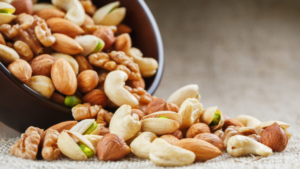Omega-3 fatty acids are essential for the body, as they help regulate cholesterol, balance hormones, and improve the function of the nervous system. Their deficiency can lead to mood disorders and affect overall well-being. Therefore, it is essential to include foods rich in this nutrient in the diet, especially those of organic origin.
There are three main types of Omega-3: alpha-linolenic acid (ALA), found in plant sources; eicosapentaenoic acid (EPA) and docosahexaenoic acid (DHA), which are found in fish and other animal products.

Which organic foods are rich in Omega-3?
Nuts and Seeds
Walnuts are the most prominent source of Omega-3 among nuts, with 6% of their fat content composed of this nutrient. Also noteworthy are flax and chia seeds, which can be easily added to different dishes.
Fatty Fish
Sardines, anchovies, tuna, salmon, and mackerel are some of the species with the highest EPA and DHA content. Specialists recommend consuming fish at least twice a week to obtain a sufficient amount of these essential fatty acids.
Legumes and Grains
Soy, in its various presentations (edamame, tofu, or oil), is an excellent source of Omega-3, with 3.2 grams per 100 grams of oil. Likewise, oats provide 1.4 grams per 100 grams, making it the cereal with the highest presence of this nutrient.
Vegetables and Fruits
Spinach, radishes, and avocado are plant foods with a significant amount of Omega-3. Although their contribution is not as high as that of fish, they are an ideal alternative for those following vegetarian or vegan diets.
Vegetable Oils
Cod liver oil is one of the richest sources of EPA and DHA, while rapeseed and flaxseed oil stand out for their balanced proportion of essential fatty acids.
Experts suggest obtaining Omega-3 fatty acids through diet rather than resorting to supplements, except in specific cases such as allergies or dietary restrictions. A balanced diet based on organic foods ensures an adequate intake of these essential nutrients, benefiting both personal health and the environment.
 Sardines are a great source of omega-3. Photo: Pixabay.
Sardines are a great source of omega-3. Photo: Pixabay.
What are the benefits of omega-3?
Omega-3 fatty acids have many health benefits, including:
- Improve cardiovascular health
- Reduce the risk of arrhythmias
- Decrease plaque buildup in arteries
- Improve blood pressure
- Have anti-inflammatory properties
- Help reduce the risk of dementia
- Protect against macular degeneration
- Strengthen the immune system
- Aid in muscle recovery
- Stimulate hair growth
Omega-3 also provides calories to energize the body and can be consumed as dietary supplements.
Have you visited our YouTube channel? Subscribe now!

